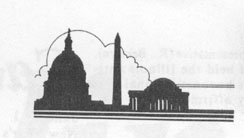

Washington
By TOM LITTLEWOOD
What Carter's election is likely to mean to Daley, Thompson and Illinois' senators
JAMES EARL CARTER, governor of Georgia for one term, recites the oath later this month that will make him the 39th President of the United States. Carter first won the nomination of the Democratic Party and then the presidency itself by capitalizing on public dissatisfaction with political Washington. The federal government was viewed as unapproachable, wasteful, amoral, crusted over with bureaucratic regulation, out of touch with the real interests of the people. As the first nonproduct of the Washington establishment to become chief executive since the return of military hero Dwight D. Eisenhower from Europe in 1952, Carter projected a refreshing folksy image on the national screen.
Coming out of nowhere, his miraculous achievement disproved the accepted modern adage that a remote state personality cannot hope to aspire to the nation's highest prize because he cannot compete for video attention with politicians in Washington, New York City and other brightly lit places where the network crews are quartered. It was not until Carter got soaked in TV coverage that he started slipping precariously. According to pollster Lou Harris, the candidate's well publicized cozying up to the established powers in the party cost him dearly after the nominating convention. Every time he was pictured marching down Chicago's State Street at Mayor Richard J.Daley's side the race got closer.
The change of administrations is not likely, however, to signify a state renaissance. Carter was generally disliked by the fraternity of governors who realized that he was harvesting the post-Watergate disillusionment rather than advancing the cause of federalism. As governor and as presidential candidate, Carter wanted to channel shared federal revenues directly to the cities, bypassing state governments entirely. And based on past performance, the Democratic majorities in Congress will be pressing for more programs of categorical assistance to the financially ailing cities of the Midwest and Northeast.
Just what part this country farmer from southern Georgia plays in the effort to reallocate federal resources away from the prospering Sun Belt region, thus redressing what is perceived by some at least as a regional imbalance of power, will be a fascinating political exercise to watch. The new President is a symbol of the Rising South. But black voters, both in the urban centers of the North and in the South, may have given him his thin electoral college victory.
His relationship with the old pro from Bridgeport — Mayor Daley of Chicago — ought to be especially interesting. Under two Republican presidents, Daley has been in the uncomfortable position of having to write polite letters to lower level bureaucrats arguing the merits of this or that case. When there is a Democrat in the White House, the mayor likes to dial the Oval Office direct. On matters like the Crosstown Expressway, Daley will not be wasting his time hereafter with some deputy secretary of the Department of Transportation. Lyndon B. Johnson's commissioner of education cut off funds to Chicago schools because of discriminatory attendance areas; shortly thereafter the funds were restored and he was the ex-commissioner of education.
Although Carter won by bringing the Deep South back into the Democratic presidential column — and in fact Daley failed to deliver Illinois as he had for John F. Kennedy in 1960 — the mayor must still enjoy a special position in the new President's eyes. Midway through the primaries, the old lions in the party could have tried to gang up on the neophyte Carter, but they did not.
Regardless of who is president, the mayor of Chicago and the governor of Illinois engage in a continuous political polka as they maneuver for federal funds and the leeway to spend them. Now the dance will take on additional significance because of the identity of Illinois' new governor. Unlike Jimmy Carter when he moved into the governor's mansion in Atlanta, Big Jim Thompson was being touted for the presidency by the national journalistic fortune-tellers before being elected to his first office. The Carter administration will not be anxious to do any favors for or help polish the image of a prospective 1980 opponent.
There is one Republican in Washington who can be either an advantage or a complication for Thompson, and that is the senior senator from Illinois. Charles H. Percy has been hungering for the White House, impatiently at times, for at least 20 years. Sort of a stretch-model Percy, Thompson has suddenly been thrust upon the national scene with a vigor that can only diminish Percy's chances. It would be contrary to human nature for most men to take this gracefully.
The power to name federal judges and prosecutors passes from Percy to the Democratic senator, Adlai E. Stevenson. The caliber of Stevenson's selections will be compared with Percy's meritorious record of judicial appointments. But Percy did not have a Daley to satisfy, and Stevenson does. The damage inflicted upon the Democratic organization during the past eight years by prosecutor Thompson and the federal judiciary underscores the importance of those appointments. Whether Stevenson can withstand the pressure to reward party hacks will test his courage and independence. ž
January 1977 / Illinois Issues / 31